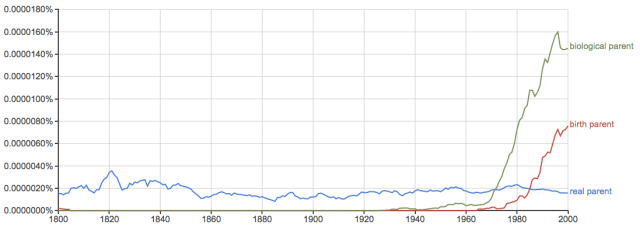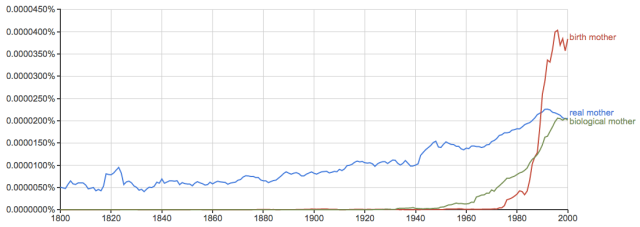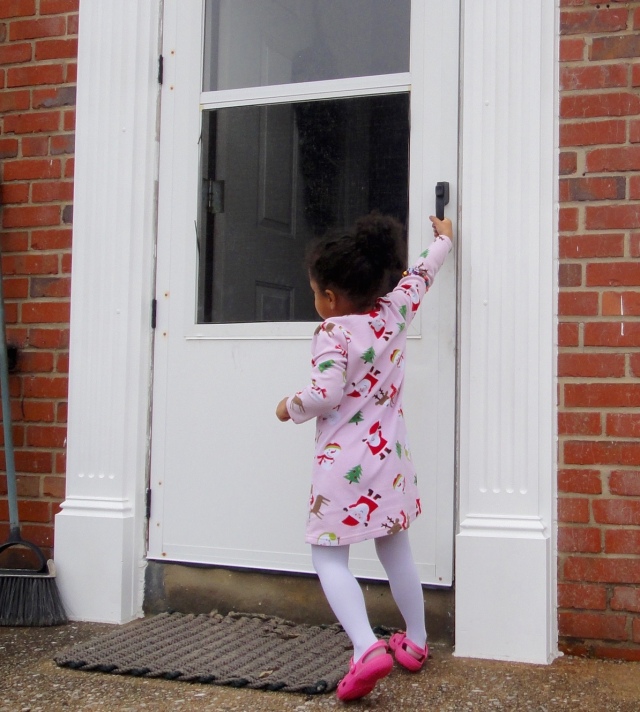I don’t want to make too big a deal here, but I’ve got a little PSA. It’s about something I feel like I’ve always known, something I assumed everyone knew, something that I thought was common knowledge, common sense. But then, a few years ago, an elderly acquaintance said it, and I was stunned. I chalked it up to a generation gap or maybe a difference in education. But then, a senior academic also said it, and again I was stunned, and again I chalked it up to a generation gap. Although this time it was odd because he had said it about a member of his own family. And then, one day, one of my own family members said it — someone younger than me, even. I was floored, and I had lost my age-based explanation. It occurred to me that this is just something that some people have thought about and other people haven’t.
That probably applies to most things in life, but this is something that I have some personal investment in.
What I’m talking about is the use of the word ‘real parents’ to describe an adopted child’s biological parents.
It doesn’t take a long to see why the term ‘real parents’ is is problematic: if the biological parents are the real parents, then the adoptive parents must be something other than real. Fake? Imaginary? Artificial? While I quite like the idea of being a ‘surreal’ parent, especially because the parenting experience is so often surreal, I don’t think that’s the first implication that comes to mind (unfortunately). 🙂
I’m sure that none of the people who I’ve heard use the term ‘real parents’ actually thinks that I am less of a parent to my child than my child’s biological parents. And I’m certainly not going to deny that giving birth is any less ‘real’ than raising a child. (And wow if there isn’t a ton of realness involved in fostering, as well…!) The point is not who is more ‘real’ than who, but just that all parents are ‘real’ parents, and so using the term is not a good way to distinguish between different relations to a child. Different families will have their own ways of referring to these relationships, too, but I’ve personally not met a someone who had been adopted who refers to their own biological parents as their ‘real parents’. (That said, I would also not be surprised if I was wrong about that; please leave a comment below if you have some counter evidence!)

“Real Mom” T-shirt (Image from http://hubpages.com/family/Open-Adoption-through-Foster-Care)
Implications of fake parenting aside, the use of the term ‘real’ can lead to confusion. Imagine if someone were to ask me, “Are you her real mother?” How should I answer? I could say “yes” based on the fact that my daughter calls me “mom(my),” thinks of me as her mother, is legally my child, and will be parented by me for the rest of my life. Or I could infer what they’re asking and answer “no” because I’m not her biological mother. Both are right and both are wrong. Similarly if someone were to ask me, “Have you met her real father?” I could truthfully say “no” if I were to infer that they were asking about her biological father, or I could truthfully say “yes” since I’m married to the person who she calls “dad(dy)” and who parents her daily and will parent her for the rest of his life. Regardless of whether or not the term ‘real parent’ is insulting, at the very least it is potentially ambiguous and confusing.
But then why is it so pervasive? Why am I apparently in the minority?
I’ve been meaning to blog about this topic for a few weeks now after hearing Ira Glass use the term ‘real mother’ on an episode of This American Life. Again, I was stunned. I went to Twitter and Facebook anticipating an outcry and actually only found a handful of tweets and a couple posts calling him out on it. It also turns out that the episode was a rebroadcast of an episode that originally aired in 2002. So I did a wider Google search for any reactions to the episode prior to 2015 and found some discussions from 2010, after it had also been rebroadcast, including this blog post which basically says the same thing I’m writing now. But, all in all, very little in the way of discussion on the interwebz. So are we-who-blog-on-this-topic in the extreme minority? As someone who works on language variation and change, my first thought is to consider this a particular example of language change in progress, one in which with those of us in the ‘adoption community’ are hanging out at the beginning of the S-curve. (I may have adopted only recently but I’d thought of myself as a future adopter for most of my life.)
So… to Google Ngrams!
At least when we look at the data from Google Books, we can see some evidence of change, namely an increase in the ‘biological’ and ‘birth’ terms, and maybe a slight decrease in the ‘real parent’ term, although actually not by that much. The big jump for the former two is not surprising, really. What is a little surprising is that ‘real’ has been outpaced by both ‘birth’ and ‘biological’ since the 1960s, which maybe explains why I had the impression that it was common sense. On the other hand, there’s no information within the Ngram search about domains of use; perhaps all these authors are people involved with adoption talking amongst themselves. It’s also not totally clear why ‘biological’ is so much more frequent than ‘birth’. For that, let’s consider gender.
Starting with moms:
(Note that this probably includes instances of the use of ‘real mother’ meaning ‘big’ as in “a real mother of a car” http://www.ldoceonline.com/dictionary/mother_1)
In contrast to the ‘parent’ chart, ‘birth’ is much higher than ‘biological’ for references to mothers. This is interesting to me because I’ve seen online discussions that expressly disfavor the term ‘birth mother’ because it’s felt to be too dismissive of the actual relationship, focusing too much on the first and ignoring both the nine months leading up to the birth as well as, in many cases, the caregiving that the biological mother did post-birth. At the same time, to just talk about ‘biology’ is could presumably also be felt to dismiss those same emotional or caregiving aspects of the relationship, but for some reason, ‘bio mom’ is what I most often see in online discussions that I’m a part of.
Now let’s look at dads:
Since mothers are the ones doing the birthing, that particular gender difference isn’t too surprising, but at least now we can maybe see why ‘biological’ outpaced ‘birth’ in the ‘parents’ graph. I’ve personally found the term ‘birth father’ awkward when I use it with my daughter, for that very reason. Unfortunately, ‘biological father’ is just such a mouthful for a 3-year-old! Maybe that’s why some people fall back on saying ‘real father’ — it’s short and easy! But then again so is ‘bio dad’, which I might use when my kid’s older and can understand what’s meant by ‘bio(logical)’. On another note, I wonder what accounts for the steady increase in the use of ‘real dad’. I would love to know more about the kind of texts that that term appears most often in. Has there been a rise in plots of novels that hinge on revealing that someone’s father is not really their father, for example? But now I’m getting sidetracked.
EDIT: An astute observer and Ngrams user suggested on Facebook looking up the also-somewhat-problematic term “natural parent/mother/father” as well, which shows an interesting recent downward trend. That’s actually still the term used by my own family’s adoption agency. Anyway, I decided to just present all the terms together into one plot. (I also tried “first parent/mother/father” but it wasn’t frequent enough to make it onto the chart.) Interesting results overall: people talk about birth mothers, biological fathers, and then real mothers and fathers:

A comparison of referring terms
In short: Adoption is complicated! Referring terms are complicated! But what I do know is that parenting is very real, regardless of the way in which a parent becomes a parent.
PSA over. Thanks for reading, and for letting me be real. 🙂





One of the terms we use with our family is ‘first’ family. Now that the girls are older, birth and biological are an option too. We also use ‘mommy’ and ‘daddy’ in the girls’ first language and then just brother and sister for siblings. Have to say, my own mother used ‘real’ mother at Christmas and I had to call her out.
Oh yes! I forgot about ‘first’ but I like that as well. And using their first languages is such a great opportunity. And then, yeah… your Christmas experience is a familiar one. It amazes me that it’s still so common.
Yeah, there is a real crummy lack of good referring terms for parents whose relationship is anything other than “Gave birth to you and are raising you.” For instance, if I refer to my foster mom, people think I’m a foster kid or at least was one for a long period instead of just eight months. Nope! Just have a good relationship with her!
I also desperately want an evaluation-neutral term for my brother’s baby mamas. “Baby-mama” has the right definition but it’s derisive. I usually just call them my sisters-in-law and let people puzzle why I have two more SILs than I do brothers.
Not quite what you’re blogging about here, but I also wonder how much of this is the thing I’ve been thinking about of late: the naive assumption that there’s some sort of love magic contained in biology. I do get that…if you love and are loved by your biological parents, it’s probably hard to imagine that it’s the same even if it’s not biological, and to imagine that the love isn’t caused by the biology. Especially since so much of our discourse about parenting is about biology. I always feel that sentiment lurking beneath questions of…”You’re in your thirties…you don’t want to search for your real parents?” And it’s like, “I don’t need to search for them; they still live in the house I grew up in, dude.”
Anyway. Long comment. Great post!
Thanks so much for your comment, Jessi! It never even occurred to me that my kid will probably have those same types of conversations with people when she mentions her loving foster family in the future. And yes yes yes to struggling against the idea that biology is necessary for love. My first response to this idea is to point out the fact that society expects that people will fall romantically in love with people who they’re precisely *not* biologically related to, so why is it impossible to fathom falling parentally in love with a child we’re not biologically related to? Because parenting love and romantic love are treated as totally different, I guess. Maybe we don’t *really* think that romantic love is actually ‘for life’? That it’s lesser than parental love, somehow? Obviously it’s very different but fundamentally not *so* different I don’t think. We also don’t talk enough about the fact that it’s often hard at first for parents, biological or adoptive, to fall in love with their children straight away; in both cases, it can take time. Anyway, I would love to talk with you more about all of this!
P.S. Love the use of SILs in that way! I think making people puzzle is perfectly fine. 🙂
Love it. Every word. 🙂
Historical/goigle diff in genders might also have to do with what dads are called when parents are divorced/separated and there’s a “new dad” (based on moms most frequently being guardians)? Not all of this will be adoption-related (and I’ve heard people refer to either of the two dads of a “divorced child” as real dad).
Thank you for your comment! I had two similar postings on Facebook. It’s a use of ‘real dad’ that didn’t even occur to me; even though I grew up with with a step-dad I don’t think I ever thought of him as not real. But as far as accounting for the increase in use of the term, I’m sure you’re on to something!
I have always known my genetic donors as biological parents. One time when discussing my “status” as an adopted child with an aquaintance, they referred to my mom and dad as not my real parents. I remember I was put off by that response. I quickly informed them that, while not my biological parents, they were my real parents. I don’t think they got it. Seems some can’t separate the two. Very odd. I also think sometimes it is seen as you have less worth as an adoptee. I though like to think that we are very lucky because we were “chosen” not just a “random luck of the draw” placement. Hugs to you and your daughter. 🙂